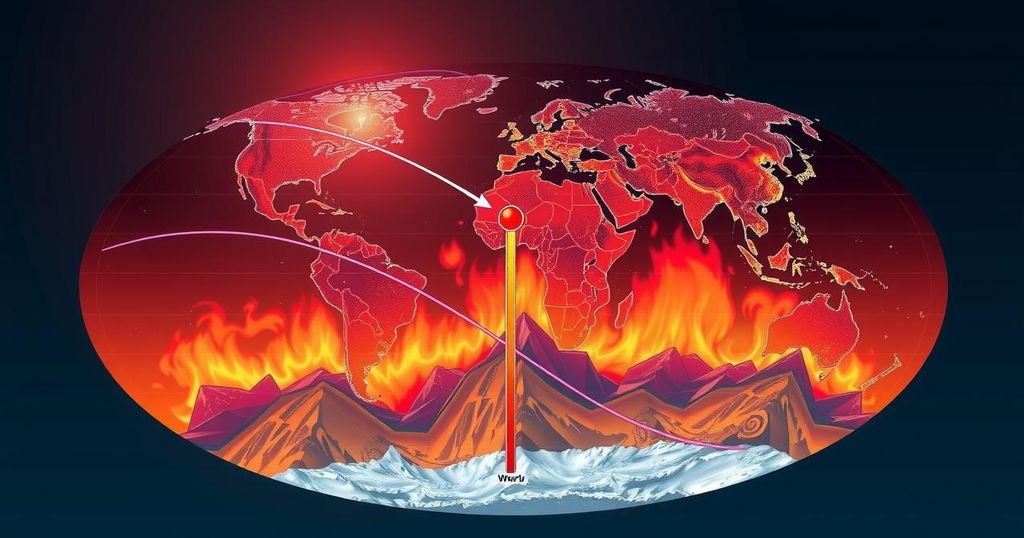The NOAA report confirms that 2024 set a record as the warmest year globally, with significant temperature increases noted. Antarctic sea ice coverage reached its second-lowest extent on record, while the upper ocean heat content also hit record highs. Regional temperatures soared, highlighting the urgency of addressing climate change as the planet experiences unprecedented warming trends.
In a comprehensive analysis by NOAA’s National Centers for Environmental Information (NCEI), it has been confirmed that 2024 was the warmest year ever recorded for our planet. This unprecedented heat wave led to a significant reduction in Antarctic sea ice coverage, which is now at its second-lowest extent on record. The report emphasized several highlights that illustrate the alarming state of our climate.
According to the report, the average temperature of the Earth’s land and ocean surfaces in 2024 was approximately 2.32 degrees Fahrenheit (1.29 degrees Celsius) above the 20th-century average. This figure marks the highest global temperature recorded from NOAA’s extensive datasets dating back to 1850. Notably, it is 0.18 degrees Fahrenheit (0.10 degrees Celsius) warmer than the previous record set in 2023.
Regionally, Africa, Europe, North America, Oceania, and South America reported their warmest years on record. In contrast, Asia and the Arctic regions experienced their second-warmest years. The alarming trend is evident as all of the ten hottest years since 1850 have occurred within the last ten years, with 2024 exceeding pre-industrial temperature averages by 2.63 degrees Fahrenheit (1.46 degrees Celsius).
Other reputable scientific organizations, including NASA and the Copernicus Climate Change Service, corroborated NOAA’s findings, further establishing 2024’s status as the warmest year.
The report also detailed that Antarctic sea ice extent averaged 4.00 million square miles in 2024, marking it the second-lowest on record, while Arctic sea ice coverage measured 4.03 million square miles — the seventh lowest. Additionally, the upper ocean heat content achieved a record high, indicating an alarming accumulation of heat in the upper layers of the ocean, a major concern since the oceans absorb 90% of the excess heat generated by climate change.
Furthermore, the report noted that global tropical cyclone activity remained near the customary average, with eighty-five named storms being reported worldwide in 2024. This included forty-two storms achieving tropical cyclone strength and several reaching Category 5 intensity on the Saffir-Simpson scale, although the overall cyclone energy was about 21% below the 1991–2020 average.
The extensive analysis provided by NOAA highlights the ongoing urgency surrounding climate change, showcasing a critical need for immediate and effective action to address these concerning trends.
Climate change is an ongoing global crisis characterized by rising temperatures, melting ice caps, and extreme weather events. Data from scientific organizations, including NOAA, provide essential insights into the changing climate by analyzing temperature trends, ice coverage, and oceanic conditions. The significance of this report lies in its documentation of 2024 as the warmest year on record, highlighting the alarming trajectory of our climate system. The implications of these changes are far-reaching, affecting ecosystems, weather patterns, and human health and safety.
In conclusion, the NOAA report clearly establishes 2024 as the warmest year on record, accompanied by record low levels of Antarctic sea ice and unprecedented upper ocean heat content. The findings underscore the urgent challenges posed by climate change, emphasizing that immediate interventions are necessary to curb further increases in global temperatures and to mitigate the impacts on both human and ecological systems. The trends observed are deeply concerning and warrant concerted global action.
Original Source: www.noaa.gov






